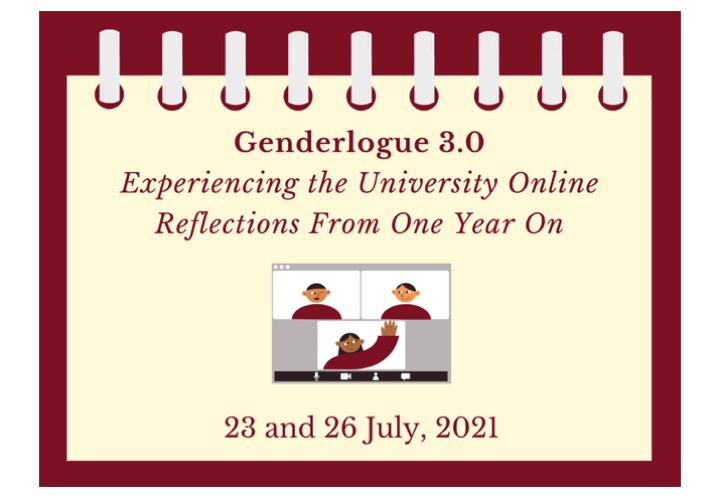Experiencing the University Online: Reflections From One Year On

Watch the Genderlogue 3.0 discussion here
In early 2020 with the onset of the Covid-19 pandemic, leaders and policy makers called for ‘lockdowns’ and declared ‘shelter in place’ orders across the world. This meant that many students, researchers, and educators left their educational institutions to stay home. However, they were expected to continue learning, researching and teaching, remotely. University education has never been just about classrooms, lectures, lab work, field visits and examinations. The learning and unlearning processes lies within the everyday interactions with the peers, faculty, infrastructure (such as libraries, labs, hostels, conferences, cafes, commute, etc.) and the larger campus community.
With the outbreak of Covid-19 and the consequent shift of the university online, we seek to explore the changes to the experience of the university. Have we been able to replicate the university experience online, or are there gaps and misses? What might we seek to take forward?
Online learning is not a new phenomenon. In the past few decades, internet and digital platforms have grown to complement the university life from the gradual introduction of email groups, digital access to books and articles, to Facebook and WhatsApp groups to augment classroom interactions. Platforms such as Coursera and edX offer courses from universities across the world that bridge the geographical divides of ‘accessing’ quality education. Their appeal lay in allowing people to choose what they learnt in order to add to their knowledge and/or profile from the comfort of their own homes at relatively affordable rates, at their own pace.
Email chains and WhatsApp groups only complement the in-person classroom/university experience. They do not replace it. Coursera and edX offer the option of life-long and customized learning, should one seek it. These platforms did not seek to offer a complete alternative to in-person university. Something that was a choice, with Covid-19 outbreak became a norm which had to adopted, adjusted and embraced overnight. ‘Online’ was presented as the only, indeed nearly universal solution to lockdown. Collectively we turned to online platforms such as Zoom. What was once an option, an addition, soon became the only way to access education and research. A few days in, it became clear that the attempt was to replicate the university — classrooms, extracurriculars, social connections, research, teaching — online.
How has this played out? How has it impacted the ‘experience’ of the university? Has it been possible? What has been the nature of the shift to online platforms, methods, and spaces? How do we measure the successes and/or failures of this shift?
In this context, Log-in Gender’s Genderlogue, an online discussion forum, titled ‘Experiencing the University Online: Reflections and Conversations One Year On’, engaged with some of these questions. This Genderlogue brought together young educators, researchers and learners from diverse academic backgrounds to connect virtually and reflect on some of these concerns.
The discussion explored questions such as how was this move online navigated? What have we learnt? What might we do differently? What might we carry into a post-pandemic world? What have we reflected upon on the nature of education? It specifically focused on responses around issues of accessibility, health, campus community and research work.
Can online education make the process of learning more accessible? What measures were taken to make it accessible for everyone? How can the existing gaps be filled in? How did moving online affect mental and physical health? How did the university address health-related challenges? Was this new online mode able to replicate the ‘community’ of a campus space? Was it able to support relations of affect between students and teachers? How did research work that requires field work function (or not) due to online mode? Are the changes different across disciplines? How did lab work take place? How did the decision to move online help or hinder our selves, communities and work?
This Genderlogue took place over the course of two days. The first day consisted of a day-long online discussion forum, on Log-in Gender, where participants reflected on and shared their experiences of online education during the pandemic. On day two, a virtual discussion with some young researchers, learners and educators from our network was hosted on Zoom.
